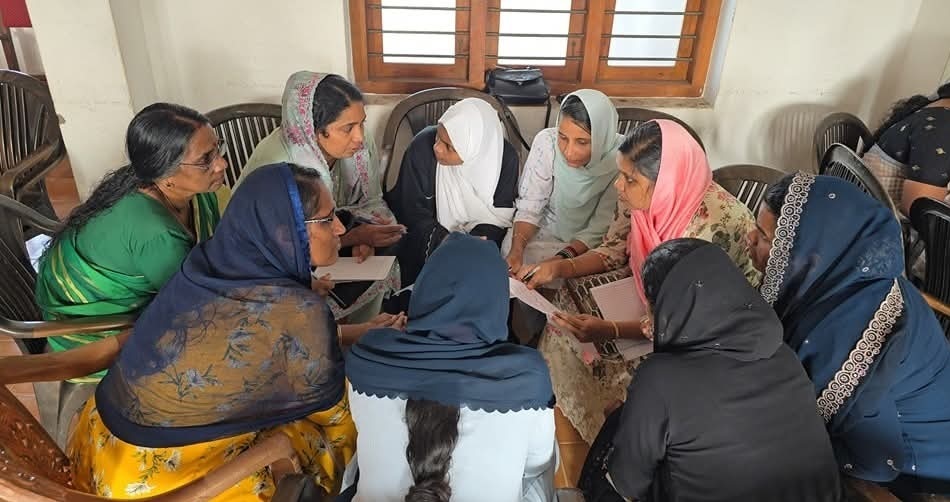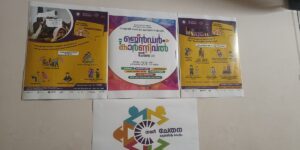Published Jan 20, 2025 | 1:00 PM ⚊ Updated Jan 26, 2025 | 12:13 PM

Kudumbashree has become a vital network, connecting communities with initiatives like Snehitha, a support system for women and children in distress.
It was 7.30 pm on Saturday, 18 January, and Kochi, widely known as the commercial capital of Kerala, was still alive with its vibrant hues, bright lights reflecting off the bustling streets and the rhythmic hum of city life.
Yet, beyond the city’s charm lies a shadowed side, especially in its suburban pockets.
These quieter, less illuminated stretches often evoke an eerie sense of insecurity. If you’ve ever felt helpless or fearful in such moments, remember this, help is just a call away.
That help is “Snehitha”. Once just a 24-hour gender helpdesk, its significance grew dramatically after the infamous Pathanamthitta serial abuse case shook the nation. It was Snehitha that brought the harrowing details of the case to light.
To understand its impact, South First visited the Snehitha centre in Kakkanad of Kochi, a home away from home for many women in distress.
The three hours there revealed the heart and soul of Snehitha. Every 10–15 minutes, the phone rang, each call carrying a plea for help or a cry for support.
The staff there were calm yet unwavering, skillfully balancing empathy with swift decision-making.
Not a single call went unanswered, each one met with heartfelt concern and immediate action.
The walls of the centre were adorned with drawings and words by survivors, powerful expressions of their suffering, resilience, bravery, and their hope for a brighter tomorrow.
Kavitha, a counsellor, and Aisha Beevi, the community counsellor, are managing the night shift this week at the Snehitha help desk in Kochi.
When South First contacted them to book an appointment, they said, “You can come anytime, we’re here 24/7.”
Located on Kunnumpuram Road, Kakkanad, the Snehitha help desk operates out of a rented house.
Inside, the Snehitha centre doesn’t feel like an office at all.
When asked why the centre, even after 10 years of operation, continues to function in a home rather than a dedicated office space, Kavitha explained to South First, “The women and children who come here often arrive from noisy and violent environments. Most come straight from their homes, either brought by the police or on their own.”
“When they step into this space, it should feel like home, not a formal, intimidating office. That sense of familiarity and comfort is crucial for their healing process. This is why all 14 Snehitha centres across Kerala operate from similar houses,” she added.
When asked about the cases reported in 2025, up to 18 January, Kavitha promptly retrieved the data from the database. Maintaining an accurate database and regularly reporting it to higher authorities is mandatory at Snehitha centres.
The data revealed seven cases of domestic violence, three family issues, three child-related issues, two couple-related issues, and two cases involving elderly individuals.
Cases of domestic violence and those under the Protection of Children from Sexual Offences (POCSO) Act are immediately reported to the police and the Child Welfare Committee (CWC).
Other issues are initially addressed through a counselling session, where most cases are resolved. Even after a case is officially closed, the centre ensures regular weekly follow-ups to monitor the situation.
Kudumbashree, Kerala’s grassroots poverty eradication and women’s empowerment program, operates through Neighbourhood Groups (NHGs), Area Development Societies (ADS), and Community Development Societies (CDS). It has become a vital network, connecting communities with initiatives like Snehitha, a support system for women and children in distress.
Naseema, a Kudumbashree member, shared how Snehitha’s “Democracy in the Kitchen” session resonated with members. “For diverse women, understanding democracy from their perspective is key. Equal participation in the kitchen is democracy, and it helps apply that principle to other areas of life,” she told South First.
Kudumbashree’s impact extends far beyond poverty eradication. It contributed ₹20 crore to the Chief Minister’s Distress Relief Fund for Wayanad, showcasing its role in community solidarity. At the grassroots level, Kudumbashree members serve as a crucial link between women, children, and Snehitha’s services.
The collaboration has proven essential as the number of domestic violence cases addressed by Snehitha in Ernakulam crossed 300 for the first time in the 2023-24 financial year. This steady rise highlights the growing need for such support and the crucial role of Kudumbashree in strengthening Snehitha’s outreach.
Aisha Beevi, the community counsellor, serves as a vital link between Kudumbashree and Snehitha in Ernakulam district, where 43 community counsellors are actively involved in providing support to the needy.
These counsellors, who are a combination of women from the Kudumbashree network and professional counsellors, offer immediate assistance directly within the community.
As part of the Kudumbashree Gender Self-Learning Program, 336 community counsellors were selected from 14 districts across the state.
They are trained through regular state-level programs designed to build their capacity, guided by a specialised module developed by counselling experts in partnership with the Child Development Centre.
The scope of their work includes a variety of services, such as conducting house visits to support abandoned individuals or those living alone, providing premarital counselling, addressing domestic violence issues, and conducting group counselling and awareness sessions.
Aisha Beevi, who is in charge of the Thrippunithura and Choornikkara CDS, both equipped with gender resource centres, told South First, “In most cases, women simply need someone to listen. Our role is to identify such cases and refer them to higher authorities.”
“We also have ‘Vigilant Group’ members in each ward who are part of the Kudumbashree network, and they handle issues ranging from domestic violence to stray dog problems. Gender Point Persons (GPP) in each ward specifically address concerns from a gender perspective, ensuring continuous training for all members involved,” she added.
When Kavitha and I entered the rooms at Snehitha Centre, she warned me that the art inside might surprise me.
The walls were covered with drawings and poems, reflecting the mental states of the survivors. Most of the artwork came from children with their mothers, but even women in distress expressed themselves through the walls.
Kavitha told South First, “We monitor the room closely, with CCTV in every corner, visiting every half hour to prevent self-harm or potential attacks. We’ve even prepared a bride here recently.”
“While the centre offers women a five-day stay with food, some misuse the service as a free hostel, so the five-day limit is enforced. We also allow boys up to 10 years old,” she added.
“In schools, we conduct counselling sessions where students often open up more to us than their teachers because they trust that they won’t be judged,” Kavitha said.
“Sexual abuse cases are particularly difficult for students to discuss, but sometimes we gather crucial information and pass it on to the CWC. The Pathanamthitta serial sexual abuse case, for example, was first revealed during one such session,” she added.
“If we don’t receive calls frequently, we immediately conduct public outreach programs. Fewer leads don’t mean fewer cases, it simply means less accessibility. We sometimes face threats from the families of survivors, especially in domestic violence cases, and we’ve encountered such incidents here,” Kavitha said.
“However, the police respond promptly in every situation,” she added.

Posters of public outreach programs
When asked about the personal struggle of dealing with such cases daily, Kavitha explained, “Some survivors tend to develop a personal connection with us, and when that happens, we intentionally switch counsellors to avoid such bonds.”
Aisha Beevi also shared her perspective, saying, “Sometimes, we can’t avoid forming that personal connection. Even when we don’t have funds, we visit elderly people during Onam, Christmas, and other times. It brings happiness. We’ve also taken them on tours, and sometimes these expenses are covered out of our own pockets.”
One of the most critical issues of Snehitha is the malfunctioning of the toll-free number. Despite multiple attempts by South First to contact this number, it remains out of service.
Fortunately, the centre’s direct contact numbers are functioning well and provide quick access, connecting on the first attempt.
Kavitha shared that each Snehitha centre is equipped with 11 dedicated staff members, including five service providers, two security personnel, one office assistant, one caretaker, and two counsellors.
The centres offer a range of vital services, such as:
Despite these services, Kavitha pointed out that there is a critical gap in legal assistance. The centres currently do not have a legal professional on staff, and individuals in need of legal support are directed to Kerala State Legal Services Authority (KELSA) or private advocates.
As the day wound down, Kavitha and Aisha remained immersed in their work, attending to calls from individuals facing domestic violence, those stranded in the city, and those who needed someone to listen.
Their commitment to offering help, guidance, and support continues, even as the centres face these ongoing challenges.
The toll-free number for the Snehitha Gender Help Desk is 1800 4255 5678.
Ernakulam- Phone No: 8594034255, 04842428745
E-mail : snehithaekm@gmail.com
(Edited by Muhammed Fazil.)

